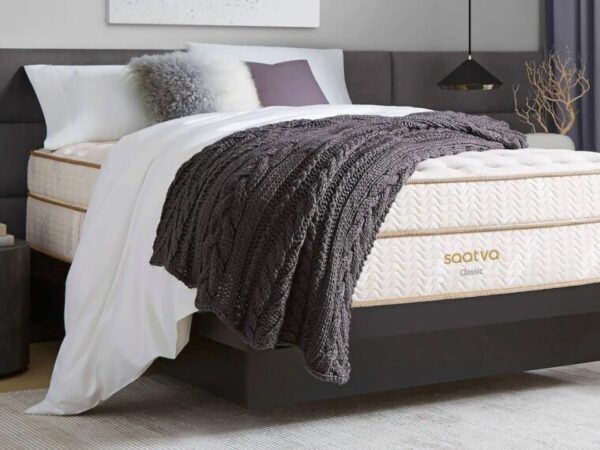We have put together what we believe is the ultimate guide to help you choose the best mattress for peripheral neuropathy.
Peripheral neuropathy is a condition that affects millions of people worldwide, causing pain, numbness, and other uncomfortable symptoms in the peripheral nerves. (1) One of the most challenging aspects of living with peripheral neuropathy is the impact it can have on sleep.

The discomfort and pain can make it difficult to fall asleep or stay asleep, leading to a lack of restful sleep that can exacerbate the condition’s symptoms.
Choosing the right mattress can play a significant role in managing these sleep disturbances. A mattress that provides the right support and comfort can help alleviate some of the discomfort caused by peripheral neuropathy, leading to better sleep quality and overall improved well-being.
This guide aims to help those suffering from peripheral neuropathy find the best mattress to meet their unique needs.
Best Mattress For Peripheral Neuropathy Summary
- Saatva Mattress – Editor’s Pick
- Nectar Mattress – Runner-up
- Puffy Mattress
- Amerisleep AS3
- Winkbed
What is Peripheral Neuropathy?
Peripheral neuropathy is a condition that results from damage to the peripheral nerves, which are the nerves that transmit signals between the central nervous system (the brain and spinal cord) and the rest of the body.
This damage can cause a variety of symptoms, including pain, numbness, tingling, muscle weakness, and sensitivity to touch. These symptoms often occur in the hands and feet, but they can affect other parts of the body as well.
The causes of peripheral neuropathy are varied and can include diabetes, certain infections, inherited disorders, and exposure to toxins, among others. The symptoms can range from mild to debilitating and can significantly impact a person’s quality of life.
One of the most common complaints among people with peripheral neuropathy is difficulty sleeping due to pain and discomfort, which is why choosing the right mattress is so crucial.
Peripheral Neuropathy and Sleep
Peripheral neuropathy can significantly impact a person’s sleep. The pain and discomfort associated with this condition can make it difficult to fall asleep or stay asleep. This is particularly true for those who experience symptoms primarily at night or those who find their symptoms worsened by the pressure of lying down on a mattress.
As a result, many people with peripheral neuropathy suffer from poor sleep quality and chronic sleep deprivation.
Poor sleep, in turn, can exacerbate the symptoms of peripheral neuropathy. Sleep is a crucial time for the body’s healing and repair processes, and lack of sleep can lead to increased pain sensitivity.
Furthermore, chronic sleep deprivation can have a host of negative effects on overall health, including impaired immune function, increased risk of chronic diseases, and poor mental health. Thus, improving sleep quality is a key aspect of managing peripheral neuropathy and improving quality of life.
How to Choose the Best Mattress for Peripheral Neuropathy
Choosing a mattress that can help alleviate the discomfort caused by peripheral neuropathy and improve sleep quality involves careful consideration of several key factors. The right mattress can significantly enhance your sleep experience, while the wrong one can exacerbate symptoms and lead to restless nights.
Support and Comfort
Support and comfort are paramount when selecting a mattress, especially for individuals dealing with peripheral neuropathy. A supportive mattress helps maintain proper spinal alignment, which is crucial in preventing additional pressure on the nerves.
An unsupportive mattress can lead to poor sleeping posture, which can exacerbate neuropathic pain and other symptoms.
Comfort, on the other hand, is subjective and depends on individual preference. However, a comfortable mattress for peripheral neuropathy sufferers often means one that conforms to the body’s curves.
This feature helps alleviate pressure points, which can be particularly sensitive for people with this condition. A mattress that strikes the right balance between support and comfort can significantly enhance sleep quality.
Firmness
The firmness of a mattress plays a crucial role in its comfort and support levels. The ideal firmness level can vary depending on personal preference and sleeping position. However, many people with peripheral neuropathy find that a medium-firm mattress provides the best balance of support and comfort.
A mattress that is too firm can exacerbate pressure points, leading to discomfort and restless sleep. Conversely, a mattress that is too soft may not provide adequate support, leading to poor spinal alignment and potential exacerbation of neuropathic symptoms. It’s essential to find a mattress with a firmness level that suits your individual needs and preferences.
Breathability
Breathability is another important factor to consider, particularly for those with peripheral neuropathy who may experience increased sensitivity to temperature. A breathable mattress can help regulate body temperature throughout the night, preventing overheating and promoting a more comfortable sleep environment.
A mattress with good breathability often features materials that promote air circulation, such as latex or certain types of foam. These materials can help dissipate body heat and maintain a comfortable sleeping temperature.
Conversely, mattresses with poor breathability can trap heat, leading to a hot and uncomfortable sleep environment that can disrupt sleep.
Durability
Finally, durability is a key consideration when choosing a mattress. A high-quality, durable mattress is an investment in your sleep health and can provide comfort and support for many years. A mattress that quickly deteriorates will not only lose its comfort and support but can also lead to increased pain and discomfort.
When considering durability, look at the quality of the materials used in the mattress and the craftsmanship. High-density foams, quality springs, and robust construction are all indicators of a durable mattress.
Remember, a durable mattress is not just about long-term savings; it’s also about ensuring consistent comfort and support for your body, which is crucial for managing peripheral neuropathy symptoms.
Best Mattresses for Peripheral Neuropathy
Here are the top 5 best mattresses for peripheral neuropathy:
Saatva Mattress – Editor’s Pick
The Saatva Mattress is our top pick for those suffering from peripheral neuropathy. This luxury innerspring mattress offers a unique combination of comfort and support that can help alleviate the discomfort associated with peripheral neuropathy.
The mattress features a coil-on-coil construction for maximum support, while a plush Euro-top layer provides a soft, cushioning surface that helps relieve pressure points.
The Saatva Mattress is available in three firmness levels, allowing you to choose the one that best suits your comfort preferences. The medium firm option is often recommended for those with peripheral neuropathy, as it provides a balance of support and pressure relief.
The Saatva also boasts excellent breathability, thanks to its organic cotton cover and airflow-promoting coil layers, ensuring a cool and comfortable sleep environment.
CHECK LOWEST PRICE
Nectar Mattress – Best Budget Mattress
For those on a budget, the Nectar Mattress is an excellent choice. Despite its affordable price point, the Nectar doesn’t skimp on quality or comfort. It features a memory foam construction that conforms closely to the body, providing excellent pressure relief – a key feature for those with peripheral neuropathy.
The Nectar Mattress has a medium-firm feel, which provides a good balance of comfort and support. The mattress also has excellent motion isolation, meaning you won’t be disturbed by a partner’s movements during the night.
Plus, the Nectar’s breathable Tencel cover and gel-infused memory foam layer help to regulate temperature, preventing overheating and promoting a comfortable sleep environment.
CHECK LOWEST PRICE
Puffy Mattress
The Puffy Mattress is another excellent option for those with peripheral neuropathy. This all-foam mattress is designed to provide a balance of comfort and support, with a medium firmness level that suits a wide range of sleepers.
The mattress features a Cooling Cloud foam layer that conforms to the body to relieve pressure points, while a firm core support layer provides the necessary support.
The Puffy Mattress also stands out for its excellent temperature neutrality. The Cooling Cloud foam is infused with gel to help dissipate heat, while the mattress’s breathable cover helps to keep the sleep surface cool. These features make the Puffy a great choice for those with peripheral neuropathy who are prone to overheating during the night.
Full Puffy Mattress Review Here
CHECK LOWEST PRICE
Amerisleep AS3
The Amerisleep AS3 is a versatile mattress that can cater to a wide range of sleep preferences, making it a great choice for those with peripheral neuropathy. This memory foam mattress features a medium firmness level, providing a good balance of comfort and support.
The Bio-Pur foam layer conforms closely to the body, relieving pressure points and helping to alleviate neuropathic discomfort.
The Amerisleep AS3 also features a unique transition layer called the Affinity layer with HIVE technology. This layer provides targeted support and pressure relief for different areas of the body, ensuring optimal spinal alignment.
Plus, the mattress’s high-performance Celliant cover is designed to convert body heat into infrared energy, promoting temperature regulation and enhancing overall sleep quality.
Read more on the Amerisleep AS3
CHECK LOWEST PRICE
Winkbed
The Winkbed is a luxury hybrid mattress that combines the support of innerspring coils with the comfort of a foam top. This combination can provide the pressure relief and support needed by those with peripheral neuropathy. The Winkbed is available in multiple firmness options, allowing you to choose the one that best suits your comfort preferences.
The Winkbed features a Euro-pillow top with a gel-infused Hypersoft foam that provides excellent pressure relief. The mattress also has a zoned support system with individually wrapped coils that provide targeted support for different areas of the body.
The Tencel cover of the Winkbed enhances its breathability, helping to keep the sleep surface cool and comfortable throughout the night.
Learn More in Our Winkbed Review Here
CHECK LOWEST PRICE
Tips for Enhancing Sleep with Peripheral Neuropathy
Living with peripheral neuropathy can be challenging, especially when it comes to achieving restful sleep. The discomfort and pain associated with this condition can make falling asleep and staying asleep difficult. However, there are several strategies that can help improve sleep quality and alleviate discomfort.
Here are some tips that can help:
Use a Firm Mattress
A firm mattress can help reduce the surface area of your body that touches the mattress, which can help alleviate the discomfort associated with peripheral neuropathy.
A firm mattress provides better support and can help maintain proper spinal alignment, which is crucial for preventing additional pressure on the nerves. However, it’s important to note that the mattress should not be too firm as it can exacerbate pressure points.
A medium-firm mattress is often the best choice for those with peripheral neuropathy. It provides the necessary support while still being soft enough to cushion the body and relieve pressure points. This balance can help reduce discomfort and promote better sleep.
Also, a mattress with good edge support can make getting in and out of bed easier, which can be beneficial for those with peripheral neuropathy.
Avoid Stimulants
Stimulants such as caffeine can make you restless at night and can interfere with your sleep. They stimulate the nervous system and can increase heart rate and blood pressure, which can make it harder to fall asleep.
Try to avoid consuming caffeine or other stimulants close to bedtime. Instead, opt for calming beverages like herbal tea, which can help promote relaxation and sleepiness.
Establishing a regular sleep schedule and sticking to it, even on weekends, can also help regulate your body’s internal clock and make it easier to fall asleep and wake up. Consistency is key when it comes to sleep, and maintaining a regular sleep-wake cycle can help improve sleep quality and reduce the symptoms of peripheral neuropathy.
Elevate Your Sheets and Blankets
If you find that your sheets and blankets come in contact with your skin and cause discomfort throughout the night, consider using a bed cradle to elevate them. A bed cradle is a frame that fits over your mattress and lifts your sheets and blankets off your body. This can help reduce discomfort and can improve sleep quality.
In addition to using a bed cradle, consider investing in lightweight, breathable bedding. Heavy blankets can put pressure on sensitive areas, while hot, stuffy bedding can exacerbate discomfort. Look for sheets and blankets made from natural, breathable materials like cotton or bamboo, which can help regulate temperature and reduce discomfort.
Limit Naps and Downtime
While it might be tempting to take long naps during the day, especially if you’re not sleeping well at night, this can actually interfere with your sleep. Long or late-day naps can disrupt your sleep-wake cycle and make it harder to fall asleep at night. Try to limit your naps to 20-30 minutes and avoid napping late in the day.
Similarly, try to avoid spending too much time in bed outside of sleeping hours. Spending excessive time in bed can weaken the association between your bed and sleep, making it harder to fall asleep at night. Instead, try to use your bed only for sleep and sex, and spend your waking hours out of bed as much as possible.
Take Nighttime Showers or Baths Early
Taking a shower or bath before bed can help you relax and can make it easier to fall asleep. The warm water can help relax your muscles and soothe your nerves, which can be particularly beneficial for those with peripheral neuropathy. However, it’s important to do this early enough so that your body has time to cool down before you go to bed.
A cooler body temperature is associated with better sleep, so try to finish your shower or bath at least an hour before you plan to go to bed. You can also consider adding relaxing elements to your bath, such as Epsom salts or lavender oil, which can further promote relaxation and sleepiness.
For more additional tips, here is a short video that you may find helpful:
Frequently Asked Questions
Can a Special Pillow Help with Peripheral Neuropathy?
Yes, a pillow designed for pressure relief can help alleviate some of the discomfort associated with peripheral neuropathy. Look for a pillow that supports your neck and head without causing additional pressure.
How Important is Sleep Hygiene for People with Peripheral Neuropathy?
Maintaining good sleep hygiene is crucial for people with peripheral neuropathy. This includes keeping a regular sleep schedule, creating a comfortable sleep environment, and avoiding stimulants before bedtime.
Can Exercise Help Improve Sleep for People with Peripheral Neuropathy?
Yes, regular exercise can help improve sleep quality. However, it’s important to choose low-impact exercises that won’t exacerbate your symptoms. Always consult with a healthcare professional before starting a new exercise regimen.
Are There Any Foods That Can Help or Hinder Sleep for People with Peripheral Neuropathy?
Certain foods can impact sleep. For example, foods high in magnesium and calcium can promote sleep. On the other hand, spicy or fatty foods, or those high in sugar, can disrupt sleep. It’s best to have a balanced diet and avoid heavy meals close to bedtime.
Can Medication for Peripheral Neuropathy Affect Sleep?
Yes, some medications used to treat peripheral neuropathy can affect sleep. Some may cause drowsiness, while others can lead to insomnia. Always discuss potential side effects with your healthcare provider.
Conclusion
Living with peripheral neuropathy can be challenging, but choosing the right mattress can make a significant difference in managing your symptoms and improving your sleep quality. When you consider factors such as support, comfort, firmness, breathability, and durability, you can find a mattress that meets your unique needs and preferences.
Remember, investing in a good-quality mattress is not just about improving your sleep — it’s also about investing in your overall health and well-being. With the right mattress and the right sleep strategies, you can manage your peripheral neuropathy symptoms and enjoy better, more restful sleep.





